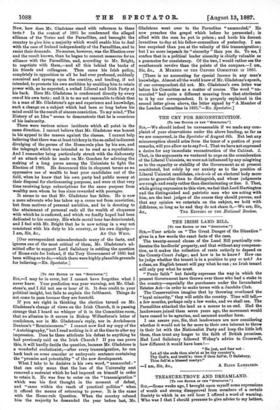[To run Emron OP VTR ..Srccraroa."] may be in error,
but I cannot have forgotten what I never knew. Your prediction was your warning, not Mr. Glad- stone's, and I did not see or bear of it. It does credit to your political insight, but fails to explain the fulfilment. Things do not come to pass because they are foretold.
If you are right in thinking the election turned on Mr. Gladstone's change of views on the Irish Church, it is passing strange that I heard no whisper of it in the Committee-room, that no allusion to it occurs in Bishop Wilberforce's letter of condolence, nor in Mr. Gladstone's reply, nor in Archdeacon Denison's "Reminiscences." I cannot now find my copy of the " Autobiography," but I read nothing in it at the time to alter my impression. Does he there attribute his defeat to anything he had previously said on the Irish Church P If you can prove this, it will hardly decide the question, because Mr. Gladstone is a wonderful evolutionist,—after every transmigration, be can hark back on some oracular or embryonic sentence containing the "promise and potentiality" of the new development.
What I take to be decisive is his own word, " unmarried " that can only mean that the loss of the University seat removed a restraint which he had imposed on himself in order to retain it. He was free to enter on the " transmigration " which was his first thought in the moment of defeat, and "came within the reach of practical politics" when it offered the means of returning to power. It is the same with the Home-rule Question. When the country refused him the majority he demanded the year before last, Mr. Gladstone went over to the Parnelites "unmarried." He now preaches the gospel which before be persecuted; is allied with the men he put in prison ; and hurls his fiercest invectives to-day at his fellow-counsellors of yesterday. I am less surprised than you at the velocity of this transmigration ; but I no more impeach its " sincerity " than you do. To me, I confess that in a political leader sincerity is chiefly valuable as a guarantee for consistency. Of the two, I would rather see the weathercock revolve than the points of the compass.—I am, Sir, &c., A MEMBER OF THE OXFORD COMMITTEE IN 1865.
[There is no accounting for special /acunce in any man's knowledge. Almost all the world knew of Mr. Gladstone's speech, if our correspondent did not. Mr. Gladstone's own letter was before his Committee as a matter of course. The word " un- married" had quite a different meaning from that attributed to it by our correspondent. It is properly explained in the second letter given above, the letter signed by "A Member of the London Committee in 1865."—En. Spectator.] •


































 Previous page
Previous page